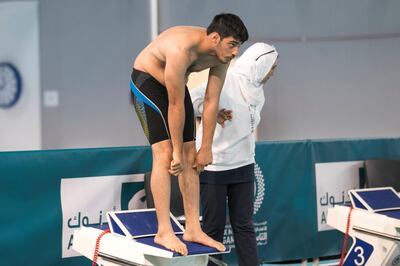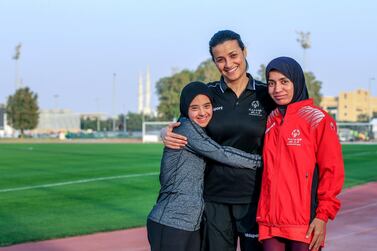The UAE's 'golden swimmer' let victory slip through his fingers at the last Special Olympics and he is determined that history won't repeat itself on home territory.
Abdullah Al Tajer, 26, has amassed a glittering collection of gold medals during his career, yet it is the one that got away that is spurring him on to more glory.
The Emirati lost out in the 50-metre breaststroke event at the Special Olympics World Games in Los Angeles in 2015 when he touched the pool with one hand and raised the other in celebration.
Competition rules laid out by Fina, the international swimming governing body, state that a swimmer must touch the wall with both hands to complete their race.
This time around, Mr Al Tajer is determined not to repeat the mistake. His dream is for a golden double at home by defending his 50m freestyle title and winning the 50m breaststroke with the correct technique.
He doesn't just want to win for himself, he wants to top the podium for the UAE President Sheikh Khalifa.

“I love Sheikh Khalifa. If I get gold, I make people happy, I make Sheikh Khalifa happy. I want get first for my country,” said Mr Al Tajer, during a break in training in Sharjah’s Al Thiqah club with other athletes.
Coach Jamal Nasser said the team had been hard at work on the two-hand touch requirement.
“Abdullah lost the gold in US because of a technical mistake. He should have touched with two hands but he touched with one because he was excited,” he said.
Touching with one hand or one hand tapping the wall before the other results in a disqualification.
Mr Al Tajer is one of about 300 athletes with learning and cognitive disabilities from the UAE who will compete next week in the first Special Olympics World Games to be held in the Middle East and North Africa.
The athletes are placed in different divisions based on their ability and skill levels.
Mr Al Tajer earned his “golden” nickname when he started winning early in big tournaments.
He won his first gold for the country as a 12-year-old in a regional games in Tunisia in 2004.
He then picked up two gold medals in the Shanghai Special Olympics Games in 2007, the first time the UAE won swim gold medals at the global event.
Since then Mr Al Tajer has gone on to win more than a dozen golds in international swim events.
“Abdullah has a lot of experience. He is the leader of our team. In Shanghai he was very young. Now there are younger swimmers in the team but he is still one of the best,” said Mr Nasser, who has been working with the UAE Special Olympics team for more than 15 years.
Watching Mr Tajer hit the pool every day motivates other UAE squad members to train regularly.
The swimmers also workout in the gym to build strength and stamina and are keen to be number one, but Mr Nasser said the victory podium was not the primary focus.
“The challenge is to make them happy, to give them a good feeling. Our second target is medals,” Mr Nasser said.
After Mr Tajer joined the squad, he changed from being a loner to someone who can easily talk to people he does not know.
“Abdullah now likes to share what he is doing. He does not want to be alone like before,” Mr Nasser said.
Others in the UAE squad too have benefited from the steady exercise routine.
Swimming has quietened the aggressive behaviour of a child with autism and the discipline of the sport has calmed another team member who is hyperactive.
Showcasing the swimmers’ achievements can inspire other parents of children with disabilities.
Mr Nasser believes watching the athletes perform during the Games will send a strong message to parents who keep their children at home because they cannot cope with the stigma and embarrassment still linked with disability in the region.
“My message is to bring the kids to us. Don’t keep them at home. Take them out. They should feel freedom,” said Mr Nasser, who shares a special rapport with Mr Al Tajer.
He makes sure the swimmer puts on a fresh T-shirt after a swim, smooths his hair, before he reels off the numerous medals his charge has won and lists out Mr Al Tajer’s other interests.
The swim champion also likes to play the guitar and names rapper 50 Cent as his favourite musical performer.
Mr Nasser beams as he watches Mr Al Tajer explain how he will teach the correct stroke to friends who he is trying to convince to learn swimming.
Reaching out to people with disabilities was simple as long as people made the effort, Mr Nasser said.
“Just find the language. It’s very easy. It is just one step, just say hello.”






